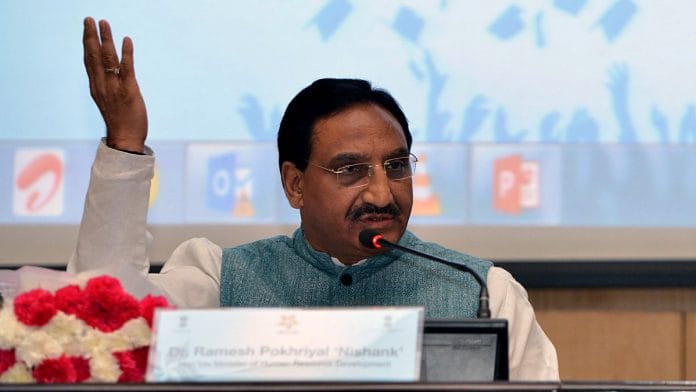New Delhi: The Union cabinet approved the long-awaited new National Education Policy (NEP) Wednesday, and with this, the human resource development (HRD) ministry will officially be renamed the Ministry of Education, officials told ThePrint.
The idea behind changing the name is to give a clearer definition to the ministry’s work. An official announcement on this will be made later Wednesday.
The new NEP will replace the existing policy which was first formulated in 1986 and last modified in 1992. The new policy is based on a draft prepared by a committee led by former Indian Space Research Organisation (ISRO) chief K. Kasturirangan.
Deliberations over the NEP, which has gone through two committees, have been going on for the last six years. The Kasturirangan panel is the second to have worked on the policy. The draft policy was released last year when Ramesh Pokhriyal ‘Nishank’ took charge as the HRD minister.
The policy has undergone several deliberations since then, including the latest change on making it ready for an education system suited to a Covid-19 world.
Consultations were held with stakeholders at all levels, including states and districts, and sources in the HRD ministry confirmed to ThePrint that additions are being made to help the education policy become more “technology-oriented” as it is the need of the hour.
Also read: How India’s poor students are falling through the gaps as schools go digital
What the policy proposes
Among other things, the draft policy has proposed a four-year undergraduate programme. It also proposes extension of Right to Education Act, 2009, to cover children of ages 3 to 18 from the earlier 6 to 14.
The policy also states there will be no hard separation of learning areas in terms of curricular or co-curricular.
Also read: 90 lakh govt college students can’t access online lessons, report states, urges aid







I hope that under the new education policy, the way history and social sciences are taught in India undergoes drastic change. Our books are based on the history written by the colonial scholars who had no sympathy or respect for Hindus and their traditions. We are now so used to look at ourselves from the Western perspective. We don’t want a saffronised history. But, we don’t want to import our history either. Our history needs to be re-written bringing out all that the colonial historians have suppressed about India, importance of its economy in the past.
Whether on the ground level education and infrastructure improve or not, BJP under PM Modi is good in changing names of places, cities, new nomenclature, now changing old nomenclature
Praiseworthy. We should also rename MEA as the Foreign Office.